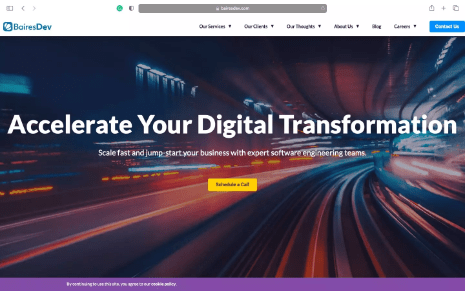Outsourcing software development and other business operations to Brazil is an emerging trend in the global services industry.
But why is outsourcing to Brazil on the rise?
Brazil is a hub for the services industry primarily due to the growing US demand for nearshore outsourcing. After all, the time zone difference between the US East Coast and Brazil is just one hour.
The Latin American nation quickly grabbed the opportunity and transformed its infrastructure, workforce, and business outlook to meet the US and global demand. Currently, top global multinationals like IBM, Infosys, and Unisys outsource their operations to Brazil.
In this article, we’ll highlight the four major pros of outsourcing to Brazil, along with important legal considerations, three practical outsourcing tips, and top companies.
This article contains:
(click on a link to jump to a specific section)
- 4 Major Benefits of Outsourcing to Brazil
- 3 Regulatory Aspects to Consider When Outsourcing to Brazil
- 3 Practical Tips To Efficiently Outsource to Brazil
- 3 Leading Outsourcing Companies in Brazil
Let’s get started.
4 major benefits of outsourcing to Brazil
An important factor in Brazil’s outsourcing success is its ideal geographical conditions.
Being the largest country in South America, Brazil offers a perfect base for delivery centers to effectively serve clients globally.
But there’s more to the Brazilian outsourcing industry than just a suitable location.
Here are some major benefits that make Brazil a serious outsourcing alternative to other countries in Latin America, as well as Asian hotspots like India and China:
1. Increased profit margins
Businesses outsource their internal operations mainly to save time and money.
Hiring and training an in-house team is expensive and time-consuming, especially in countries with high labor and operating costs.
But the cost of living in major Brazilian outsourcing hubs like Sao Paulo is significantly lower than in American or European cities. This difference in the cost of living translates to lower employee salaries and cheaper business resources.
According to Salary Explorer, the average annual salary in Brazil is USD 19,843, as compared to USD 94,700 in the USA (as per the exchange rates in September 2021).
As a result, businesses from the US and Europe can lower their operating costs and maximize profit margins by outsourcing to Brazil.
For more information on Brazil’s salary stats, read our detailed guide on the average salary in Brazil.
Moreover, due to over-saturation, global outsourcing leaders like India and Ukraine may not be as cost-effective for a growing business with a smaller budget.
However, Brazil’s outsourcing sector is relatively young, and there’s high competition among vendors — which means that a startup can get quality services at a lesser cost.
2. Skilled workforce
The continuous availability of a skilled workforce is crucial for the success of a country’s services industry.
For this reason, Brazil’s federal government prioritizes educational reforms and has been successful in creating a solid and vibrant workforce.
Software development is one of the most outsourced services in Brazil and requires developers with high-value IT skills and technological know-how. And the country has no shortage of top-notch technical universities to meet this demand.
For example, in 2021, The University of Sao Paulo is ranked 1st in the Best Global Universities in Latin America and 122nd globally.
Many software outsourcing companies have offices close to these universities, helping them recruit and groom Brazilian developers soon after graduating. It includes training them on in-demand skills like HTML and python coding.
Brazil also has a quality talent pool for services like:
- Business process outsourcing (BPO) services for back office and client facing operations.
- Financial services (accounting, asset management).
- HR (human resource) services.
- Consulting services related to legal processes, infrastructure, etc.
Due to lower competition compared to India and China, employees in the ITO (Information Technology Outsourcing) space switch jobs less frequently in Brazil. In fact, the employee turnover rate in Brazil is the lowest in the Latin America region.
The growing presence of global companies has also led to improvements in English language proficiency among Brazilian workers.
Moreover, Brazil has a diverse mix of cultures and ethnicities.
As a result, a sizable portion of Brazilian workers also speaks Portuguese, French, and Spanish (in addition to English), benefitting the local BPO and call center industry.
3. Suitable business policies
Brazil is a democratic country with a fairly stable political climate and growing economy – the two factors vital for attracting foreign investments.
Brazil’s position on the Political Stability Index (2019) (based on World Bank data) is better than outsourcing hubs like the Philippines and India and Latin American countries like Colombia and Mexico.
And over the years, the Brazilian government has taken path-breaking measures to strengthen the business ecosystem and boost the outsourcing industry in the country.
Federal programs such as the Superintendency for the Development of Amazonia (SUDAM) and the Superintendency for the Development of the Northeast (SUDENE) focus on increasing business avenues in poorer regions of the North East and Amazonia.
Growing software and IT services companies, both local and foreign, enjoy financial aid and tax incentives at federal and state levels.
Some key financial and infrastructural initiatives for the technology sector in Brazil include:
- Support Program for the Technological Development of the Semiconductor Industry (PADIS).
- Support Program for the Technological Development of the Digital Television Equipment Industry (PATVD).
- Special Tax Regime of the Broadband National Program for Implementation of Telecommunication Networks (REPNBL-Redes).
Additionally, here are some 2021 estimates for the Brazilian market by the International Data Corporation (IDC Brasil) and the Brazilian Association of Software Companies (ABES):
- The IT market in Brazil is expected to grow by 11%.
- The telecommunication market is expected to grow by 2%.
- The country will witness a massification of 5G. The technology would help generate $ 2.7 billion (U.S. dollar) through new businesses based on technologies like artificial intelligence (AI), virtual and augmented reality.
Brazil is also one of the few countries globally to make a strong push towards green energy resources such as biofuels. Around 45% of Brazil’s primary energy needs are met through renewable sources.
This sustainable approach gives the country an edge over other developed and emerging economies and could fuel economic growth in the future.
Like many other Latin American countries, the Coronavirus pandemic affected Brazil’s economy too. But swift actions, including an economic stimulus plan, have initiated a steady recovery.
According to OECD estimates, after a contraction of 4.1% in 2020, the country’s GDP growth is expected to reach 3.7% in 2021.
4. Robust digital infrastructure
Brazil has made significant advancements to its digital infrastructure in recent years. It has led to the rapid growth of the IT outsourcing sector in the country.
As of 2021, Brazil has over 90 technology parks and over 35 business accelerators across the country. Its Science and Technology Parks (STPs) facilitate research and development and contribute to social and economic growth.
These tech centers offer cutting-edge digital infrastructure and have a high concentration of companies providing information technology services.
The region of Campinas, near Sao Paulo, is one such center that’s often referred to as the Silicon Valley of Brazil.
Moreover, Intellectual Property (IP) and cybersecurity incidents in Brazil are minimal due to strong laws.
3 legal aspects to consider when outsourcing to Brazil
Brazilian law has several legal and regulatory structures that govern outsourcing transactions in the country.
We’ll highlight three such aspects that all stakeholders should consider before entering into an outsourcing partnership.
1. Service agreement
The most commonly used legal structure to regulate an outsourcing transaction is a service agreement between the customer and the service provider.
This agreement lays out the relevant terms and conditions for the transaction and protects the interests of both parties.
A service agreement becomes crucial when the outsourcing process is complex and involves transferring assets and employees between the two parties.
The agreement could specify:
- The qualification of both parties entering into the partnership.
- The nature and tenure of the service, along with its costs.
- Accountabilities and legal rights of all stakeholders.
2. Transferring of employees
Unless specified explicitly, the employees at the customer’s side don’t get transferred to the supplier (outsourcing service provider) along with the outsourced business.
However, if both the parties mutually agree on the transfer of the employees, the current employer (transferor) must first terminate the employment contract and pay up severance compensation.
The supplier (transferee) can then hire the employees and must take up all employment-related liabilities such as:
- Protecting workers’ rights.
- Withholding payroll tax and social security contribution of a transferred worker.
In case of outstanding labor or social security debts, both the customer and vendor will share the liability.
However, a direct employment relationship could still exist between the transferor and an outsourced worker despite such a transfer.
Additionally, an employment relationship could form between the customer’s respective employees and the supplier due to the outsourced process’s nature.
3. Data security and IP protection
The General Data Protection Act (LGPD) regulates how companies process personal data within Brazilian territory.
It applies to all individuals and entities in Brazil that handle such sensitive data, irrespective of where the data controller or processor is located.
LGPD establishes rules and guidelines related to:
- Core principles regarding the processing of sensitive personal data.
- The rights of a data subject (an individual whose data is being collected and processed)
- Legal bases for processing, such as consent, interests, etc.
- Data protection accountabilities.
- Transfer of personal data outside of Brazil.
- Civil liability and penalties for breach or improper handling of such data.
3 practical tips to efficiently outsource to Brazil
Here are three essential tips that will help you maximize output and profitability when outsourcing work to a Brazilian firm.
1. Understand the local business culture
When you partner with a Brazilian company, you may notice a business culture different from yours.
You must acknowledge these differences and make an effort to familiarize yourself with the local business norms and etiquette.
Here are a few pointers on successfully navigating these differences:
- Brazil has a mix of cultural identities (Paulistas, Cariocas, etc.), each with distinct business culture. That’s why you should identify your vendor’s location and engage accordingly.
- Brazilians are warm people who prefer face-to-face interactions. So don’t be surprised if a vendor asks for an in-person meeting to forge better business relationships.
- People in Brazil tend to hold back on critical opinions. You must focus on creating a good rapport from the onset and seek their honest opinions on matters.
- Portuguese is the most widely spoken language in Brazil, and a basic understanding of the language will go a long way in ensuring smooth communication.
2. Choose your vendor wisely
Before you partner with a Brazilian service provider, you must consider their location, competence, etc.
Here are some tips to help you shortlist a suitable outsourcing partner for your business needs:
- Do thorough research on the potential vendors.
- Gather information on vendor’s efficiency by examining their track record, past feedbacks, and quality of the talent pool.
- Consider a background verification of the potential vendors through a professional screening service.
- Check where in Brazil the vendor is operating from. If you have a moderate to high budget, opt for a company operating from tech parks (STPs) in hubs like Rio de Janeiro, Sao Paulo, Campinas, Brasilia, etc.
- But if you are a startup with a limited budget, look for service providers and talents in smaller cities like Porto Alegre, Curitiba, etc.
3. Stay updated on laws and regulations
It’s essential to understand the local business, cybersecurity, and labor laws before outsourcing to Brazil or any other country.
Reading up on the Brazilian laws will help you:
- Understand the country’s tax system and create an accurate outsourcing budget.
- Grab business growth opportunities as soon as they present.
- Plan ahead for the potential risk factors such as lawsuits, policy changes, etc.
- Take advantage of the government incentives and schemes to maximize profit margins.
- Protect your interests in case of unfair practices.
If you’re ready to outsource to Brazil, pick one of the following companies for your venture.
3 leading outsourcing companies in Brazil
Here’s a list of top Brazilian companies you can outsource your business operations to:
1. BairesDev

BairesDev is an IT outsourcing company with expertise in custom software solutions and IT staffing services. Headquartered in San Francisco, USA, BairesDev’s Brazil office is located in Sao Paulo.
2. Cinq Technologies

Cinq Technologies is a US-based software company that offers nearshore and outsourcing services to global clients. Its services include Agile software development, UX/UI design, IT staff augmentation, and data analytics. The firm operates from its office in Curitiba, Brazil.
3. The Growth Agency

The Growth Agency is a BPO company that offers specialized services to global companies operating in Latin America. Their services include market research, data aggregation, lead generation. Their Brazil office is located in Florianopolis.
Final thoughts
State-of-the-art infrastructure, talented IT professionals, and favorable business policies make Brazil a top outsourcing and offshoring destination.
However, complex laws and a multi-cultural society could pose unexpected challenges for a foreign company planning to outsource to Brazil.
Use the information we covered here to decide if teaming up with a Brazilian company is the right move for your business and how to go about it.

Andy is a technology & marketing leader who has delivered award-winning and world-first experiences.


